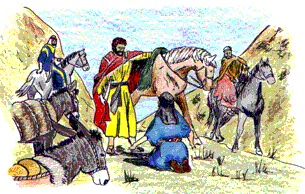Grievous Words and a Soft Answer(1 Samuel chapter 25) |
|
Paul Rose MA |
The StoryAt one time when David was in hiding from king Saul, he and his men, who numbered six hundred, were living in an unpopulated area near Carmel. In this area were shepherds looking after the flocks of a wealthy man called Nabal. David, being a righteous man, had charged his men to respect other people's property. The shepherds and David's men came to be on good terms with each other. David and his men not only left the sheep alone, but their presence was a deterrent to others who might have stolen sheep, and doubtless they were also a deterrent to wild animals which might otherwise have attacked the flock. At shearing time David sent ten men to Nabal to request a gift from him because, as he told his men to say to Nabal, they had not harmed his flock or his shepherds, or harassed them in any way, but had been friendly to his shepherds and had acted as guardians to shepherds and sheep alike. The name 'Nabal' means 'fool' and we are told that he was churlish and evil in his doings (1 Samuel 25:3). He was a bad-tempered man: one of his servants described him as such a son of Belial, that a man cannot speak to him (1 Samuel 25:17). Nabal refused to give anything to David and his men, and had he refused politely, perhaps David would have accepted his refusal with good grace; but Nabal refused so roughly and was so uncivil about David to the men that when David heard, he set out with four hundred armed men to kill Nabal and his household in revenge. |
|
Nabal had a wife, Abigail, who was a woman of good understanding, and of a beautiful countenance (1 Samuel 25:3). One of Nabal's men had heard the way he answered David's men and, knowing that evil would come of it, informed Abigail of the situation. Seeing the danger they were in, she quickly gathered some provisions for David and set out to intercept him. Her timely action and gracious words appeased David and he accepted her gift and turned back.
When Abigail told Nabal what had happened we are told that his heart died within him, and he became as a stone. And it came to pass about ten days after, that the LORD smote Nabal, that he died (1 Samuel 25:37–38).
When David heard that Nabal was dead he sent for Abigail and married her.
What can we learn from Abigail?
Abigail was a woman of good understanding. She not only understood the seriousness of the situation but was prepared to act immediately.
Understanding and wisdom invariably go together in the word of God. God was pleased when Solomon asked for understanding rather than riches, therefore Paul's message to the Ephesians stands true for us today:
...be ye not unwise, but understanding what the will of the Lord is. (Ephesians 5:17)
If that seems hard don't despair because,
If any of you lack wisdom, let him ask of God, that giveth to all men liberally, and upbraideth not; and it shall be given him. (James 1:5)
Abigail was of a beautiful countenance. God knew David's weakness for beautiful women and no doubt Abigail's appearance stopped David's anger long enough to listen to her; but Abigail conducted herself in such a way that it was her Godly manner and advice which influenced David and made him see the error of what he was about to do.
More importantly Abigail had that ornament of a meek and quiet spirit which is in the sight of God of great price (1 Peter 3:4).
And David said to Abigail, Blessed be the LORD God of Israel, which sent thee this day to meet me: And blessed be thy advice, and blessed be thou, which hast kept me this day from coming to shed blood, and from avenging myself with mine own hand (1 Samuel 25:32–33).
What can we learn from David?
When David heard that Nabal was dead, he said Blessed be the LORD, that hath pleaded the cause of my reproach from the hand of Nabal, and hath kept his servant from evil: for the LORD hath returned the wickedness of Nabal upon his own head (1 Samuel 25:39). As pointed out to him by Abigail, it would have been unlawful for him to have killed Nabal for so trivial a cause. We are told in Romans 12:17–20,
Recompense to no man evil for evil. Provide things honest in the sight of all men. If it be possible, as much as lieth in you, live peaceably with all men. Dearly beloved, avenge not yourselves, but rather give place unto wrath: for it is written, Vengeance is mine; I will repay, saith the Lord. Therefore if thine enemy hunger, feed him; if he thirst, give him drink: for in so doing thou shalt heap coals of fire on his head.
A soft answer turneth away wrath: but grievous words stir up anger. (Proverbs 15:1)
© Paul Rose 2002 <http://www.twoedgedswordpublications.co.uk/Articles/Grievous_Words_and_a_Soft_Answer.htm>

